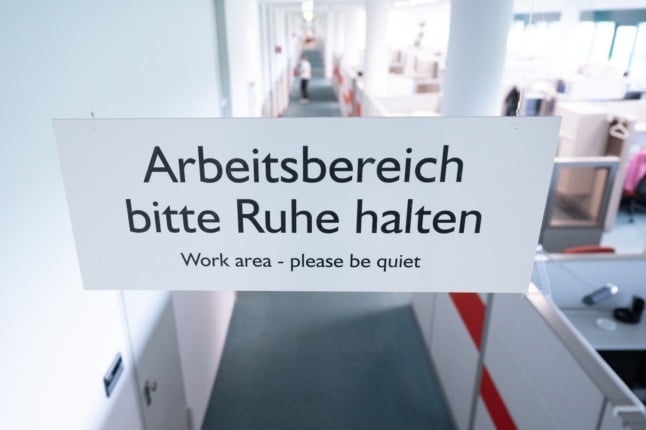Will employees in Germany have to work into their 70s?
A top economist predicts that Germany’s pension system will face serious problems in the coming years if it is not reformed.
Marcel Fratzscher, who’s headed the German Institute for Economic Research (DIW) since 2013, told Business Insider’s podcast that the current pension system would probably only work well for another “three to four years”.
Without changes to the existing pension system within the next four years, young people in particular will not only have to work longer, but also pay more taxes, he said.
“When the baby boomers born in the 1960s start to retire, then it will be really tough,” Fratzscher said. Then, he said, the government will panic and have to make drastic cuts.
He said the three major problems that need to be considered are changing demographics, rising life expectancy, and too many people with low incomes who cannot save for a private pension.
If Germany does not manage to reform the pension system in the coming years, economist Fratzscher believes there will be major upheaval.
“Young generations will be burdened more, people will have to work longer and older people will get less out of it,” he said. The retirement age will have to be raised to 70 or even higher, he added.

According to Fratzscher, there will also be higher pension contributions and taxes in the future. “Unfortunately, that is the bitter consequence if you don’t start to really reform this system now,” Fratzscher said.
The best option, he said, is to get more people into the jobs market, which means more workers paying into pension contributions. “Enabling better wages, that’s actually the key that lies in the labour market to mitigate these very painful reforms in the pension system,” he said.
The age of retirement in Germany has been slowly increasing since the year 2012, when a government reform raised it from 65. It will be raised to 67 in a series of steps.
READ ALSO: Could people in Germany soon be working until the age of 68?
Amazon to create more than 3,000 new jobs in Germany
Amazon is continuing its rapid expansion in Germany, reported the Tagesschau earlier this week. The online retailer announced the opening of eight new locations with more than 3,000 new jobs.
The US online retailer’s plans are intended to further expand the German logistics network “to meet customer demand and expand the product selection”.
This is expected to create a total of more than 3,000 new permanent jobs. Three large warehouses are planned in Dummerstorf, Helmstedt and Hof/Gattendorf, according to the statement.
Meanwhile, there will be five smaller distribution and sorting centres in locations including Friedrichsdorf, Neu-Ulm, Weiterstadt and Wenden.
Of the locations mentioned, the centres in Friedrichsdorf, Neu-Ulm and Wenden are to be built in the current year, the others in the first half of 2022.
Amazon has already created around 3,000 new jobs in Germany in the past 12 months, according to the firm. The number of permanent employees in Germany is expected to rise to more than 28,000 by the end of the year.
Did you know….
Germany is one of the most popular study destinations for international students across the world. Students are attracted for many reasons, including the career opportunities and prospects for staying in the country after graduation.
According to official figures, 411,601 students with a foreign passport were enrolled at German universities in the 2019/20 winter term.
A large proportion of them (319,902 students) immigrated for their studies. This group currently represents 12.7 percent of students at universities and 8.4 percent of students at universities of applied sciences.
A high proportion of international students (40.6 percent) are pursuing degrees in engineering – a sector that is in high demand on the German labour market.
Next most popular are law, economics and social sciences (24.6 percent) followed by mathematics and natural sciences (11 percent).
READ ALSO: Munich and Berlin among the ‘most popular university cities in the world’
Merkel says car industry can be part of climate ‘solution’
Outgoing Chancellor Angela Merkel this week said Germany’s car industry could be “part of the solution” to the climate emergency, as she opened a major motor show for the last time, reported AFP on Tuesday.
Germany’s leader of the last 16 years said she was convinced the transition to a climate-neutral economy by 2045 would be “a success” and touted her government’s steps to support it by subsidising electric vehicles and the development of charging infrastructure.
The German car industry was previously seen as “reluctant” to embrace the switch to environmentally-friendly electric cars, Merkel said at the IAA motor show, before praising the progress that has been made.
The move to electric was accelerated by the “dieselgate” scandal in 2015, when German car giant Volkswagen admitted to fitting millions of vehicles with emissions-cheating devices.
READ ALSO: Merkel’s climate strategy called into question at motor show
Merkel, who has been a regular at the IAA over the years, earned the sobriquet the “car chancellor” for her efforts in the past to shield German carmakers from tougher EU pollution rules.
“The auto industry is not just part of the climate problem, but above everything else a central part of the solution,” she told the conference hall in Munich on Tuesday.
Merkel cautioned, however, that European coordination would be needed in future to ensure “security for jobs” in the face of competition from countries where climate rules are less stringent.
Her opening speech at the IAA was her last as chancellor, before she steps down after the German elections on September 26th.
The biennial IAA is mired in controversy this year as Germany struggles to adapt its flagship industry to the electric and digital revolution.
Environmental activists blocked motorways around Munich on Tuesday, while others brandished slogans like “Stop driving climate change”.
Is this article useful?
Please get in touch with us at [email protected] to let us know if this weekly feature is useful and any suggestions you have for articles on The Local Germany.




 Please whitelist us to continue reading.
Please whitelist us to continue reading.
It is useful!